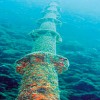 (Podgorica, 16 June 2011) – The Draft Detailed Spatial Plan (DPP) for the Undersea Cable and Transmission Line that is currently up for public debate doesn’t offer any information as to why Montenegro needs to enter this expensive and ecologically risky project, or how much this will cost the taxpayers.
(Podgorica, 16 June 2011) – The Draft Detailed Spatial Plan (DPP) for the Undersea Cable and Transmission Line that is currently up for public debate doesn’t offer any information as to why Montenegro needs to enter this expensive and ecologically risky project, or how much this will cost the taxpayers.
A detailed analysis of the draft plan’s contents clearly reveals that the document was quickly prepared, that for the most part it relies on assumptions and what we suspect are agreements already reached between the Government of Montenegro and Italy’s Terna.
In the document itself they admit that, “because of the dynamics concerning the preparation of the Plan and the obligations undertaken for the realization of the entire project by the Montenegrin state, the Plan was undertaken without additional studies that would have facilitated the work on the DPP.” Additionally, there is no proper feasibility study, nor an economic analysis that would establish the social costs of the project.
Furthermore, the plan’s economic and market projections are based on publicly available and in many ways limited data that was correct at the time of the report’s preparation, which is confirmed by the authors of the report itself. The result of this approach is that citizens still do not have all the necessary information needed to make an informed conclusion about what Montenegro’s people stand to receive and what they stand to lose from this project.
Instead of a comprehensive analysis, the authors are offering the public totally meaningless projections about the project’s influence on the development of exclusive tourism (similar to the approach taken with the hydropower stations on the Morača). The document thus speaks about the improvements that would be made to tourism in undeveloped areas of Budva Municipality like Jaz, Lučice and Buljarica, as well as new tourism facilities in the entire sub-zone of Kotor and nearby settlements.
A tourism boom is also foreseen for the North of the country, though there is no explanation of how exactly an energy project will manage to exercise such a dominant influence on the development of exclusive tourism, for instance in places like Žabljak.
As far as the other benefits are concerned, it is expected that the revenues of Prenos (Transfer) in the first year of exploitation will increase by 5/6-million euros, and to 10/11-million euros during the full exploitation phase. The proceeds are to be used to reduce the costs of transmission paid by consumers in Montenegro. The authors did not consider the fact that the profits are being realized by a company with mixed ownership, which can become private at any point.
When one considers the scale of the plan concerning the cable and transmission lines, standing at about 14,412 acres, or slightly more than 1% of Montenegro’s entire territory, the question poses itself whether or not the Montenegrin government is in a position to better valorize this space (since the revenues this project will bring pale in comparison to the damage that will occur by its sadly irreversible implementation).
The current public consultations concerning the undersea cable and transmission line are reminiscent of the last government ‘initiative’ of this type – the public debates concerning the system of cascading dams along the Morača. As in that case, the current discussions are being undertaken under conditions of total non-transparency, with secret agreements, contracts and treaties signed long ago with the Italian partner that the Government continues to jealously guard form the citizens of Montenegro.
In spite of the clear recommendation of the European Parliament expressed through a separate resolution on Montenegro, requesting that all information on the undersea cable should be made public, the Government of Montenegro in its agreement with Italy’s Terna committed itself to secrecy in the joint deal (in spite of the direct interest of citizen’s to know all the details).
The information that is available indicates that Montenegro and its citizens will have very limited use from a project demonstrating such megalomania, including its enormous costs for the budget and its serious consequences for the environment. We’re afraid that if the government remains firmly committed to this project, Montenegro faces an almost certain future as a resource base whose territory will be used not only for the production of cheap energy, but also for its transmission.
MANS



